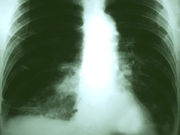Findings in patients with previously untreated disease with PD-L1 expression level of ≥5 percent
WEDNESDAY, June 21, 2017 (HealthDay News) — For patients with previously untreated stage IV or recurrent non-small-cell lung cancer (NSCLC), nivolumab is not associated with longer progression-free survival than chemotherapy, according to a study published in the June 22 issue of the New England Journal of Medicine.
David P. Carbone, M.D., Ph.D., from The Ohio State University Comprehensive Cancer Center in Columbus, and colleagues randomized patients with untreated stage IV or recurrent NSCLC and a programmed death ligand 1 (PD-L1) tumor expression level of 1 percent or more to receive nivolumab or platinum-based chemotherapy.
The researchers found that the median progression-free survival was 4.2 months with nivolumab versus 5.9 months with chemotherapy among the 423 patients with a PD-L1 expression level of 5 percent or more (hazard ratio, 1.15; 95 percent confidence interval, 0.91 to 1.45; P = 0.25); median overall survival was 14.4 versus 13.2 months, respectively (hazard ratio, 1.02; 95 percent confidence interval, 0.80 to 1.30). Overall, 60 percent of 212 patients in the chemotherapy group received nivolumab as subsequent therapy. Treatment-related adverse events of any grade occurred in 71 and 92 percent of patients who received nivolumab and chemotherapy, respectively; treatment-related adverse events of grade 3 or 4 occurred in 18 and 51 percent, respectively.
“Nivolumab was not associated with significantly longer progression-free survival than chemotherapy among patients with previously untreated stage IV or recurrent NSCLC with a PD-L1 expression level of 5 percent or more,” the authors write.
The study was funded by Bristol-Myers Squibb, the manufacturer of nivolumab, and ONO Pharmaceutical.
Copyright © 2017 HealthDay. All rights reserved.








